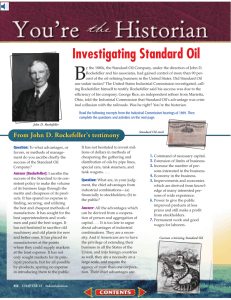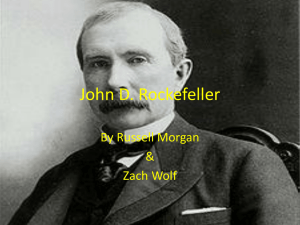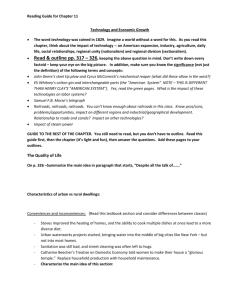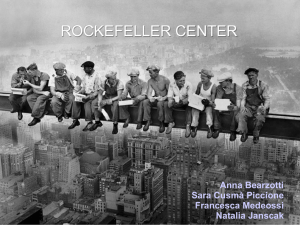Chapter 3 - Digital History
advertisement
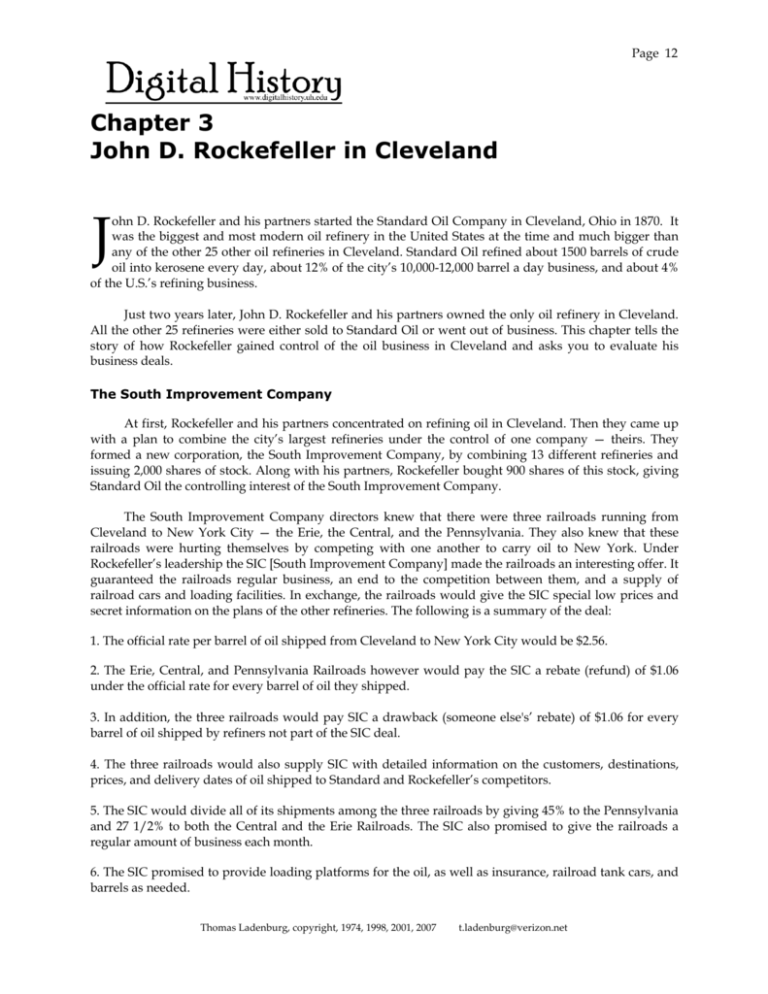
Page 12 Chapter 3 John D. Rockefeller in Cleveland J ohn D. Rockefeller and his partners started the Standard Oil Company in Cleveland, Ohio in 1870. It was the biggest and most modern oil refinery in the United States at the time and much bigger than any of the other 25 other oil refineries in Cleveland. Standard Oil refined about 1500 barrels of crude oil into kerosene every day, about 12% of the city’s 10,000-12,000 barrel a day business, and about 4% of the U.S.’s refining business. Just two years later, John D. Rockefeller and his partners owned the only oil refinery in Cleveland. All the other 25 refineries were either sold to Standard Oil or went out of business. This chapter tells the story of how Rockefeller gained control of the oil business in Cleveland and asks you to evaluate his business deals. The South Improvement Company At first, Rockefeller and his partners concentrated on refining oil in Cleveland. Then they came up with a plan to combine the city’s largest refineries under the control of one company — theirs. They formed a new corporation, the South Improvement Company, by combining 13 different refineries and issuing 2,000 shares of stock. Along with his partners, Rockefeller bought 900 shares of this stock, giving Standard Oil the controlling interest of the South Improvement Company. The South Improvement Company directors knew that there were three railroads running from Cleveland to New York City — the Erie, the Central, and the Pennsylvania. They also knew that these railroads were hurting themselves by competing with one another to carry oil to New York. Under Rockefeller’s leadership the SIC [South Improvement Company] made the railroads an interesting offer. It guaranteed the railroads regular business, an end to the competition between them, and a supply of railroad cars and loading facilities. In exchange, the railroads would give the SIC special low prices and secret information on the plans of the other refineries. The following is a summary of the deal: 1. The official rate per barrel of oil shipped from Cleveland to New York City would be $2.56. 2. The Erie, Central, and Pennsylvania Railroads however would pay the SIC a rebate (refund) of $1.06 under the official rate for every barrel of oil they shipped. 3. In addition, the three railroads would pay SIC a drawback (someone else's’ rebate) of $1.06 for every barrel of oil shipped by refiners not part of the SIC deal. 4. The three railroads would also supply SIC with detailed information on the customers, destinations, prices, and delivery dates of oil shipped to Standard and Rockefeller’s competitors. 5. The SIC would divide all of its shipments among the three railroads by giving 45% to the Pennsylvania and 27 1/2% to both the Central and the Erie Railroads. The SIC also promised to give the railroads a regular amount of business each month. 6. The SIC promised to provide loading platforms for the oil, as well as insurance, railroad tank cars, and barrels as needed. Thomas Ladenburg, copyright, 1974, 1998, 2001, 2007 t.ladenburg@verizon.net Page 13 7. The terms of this deal (see box on right) would remain secret. There is no doubt that both the railroads and Rockefeller thought they had made a good deal. Rockefeller Uses the South Improvement Company Deal With a copy of his deal with the railroads in hand, Rockefeller and his partners paid calls to the refineries that were not included. They told them that they could continue to compete with Rockefeller if they wished, but that Rockefeller has a special arrangement with the railroads that effectively shut them out. Then, Rockefeller and his partners offered to buy refineries for about 45% of what their owners thought they were worth. They said they would not pay more than the value of the company to Standard Oil, and that they would pay with Standard stock or with cash. In some cases the deal was sweetened by an agreement to allow the seller to continue to manage his former company but only on the condition he not tell anyone, not even his wife, that he had sold his company. I, -- -, do solemnly promise upon my honor and faith as a gentleman that I will keep secret all transactions which I may have with the corporation known as the South lmprovement Company; that should I fail to complete any bargains with the said company, all the preliminary conversations shall be kept strictly private; and finally that I will not disclose the price for which I dispose of any products or any other facts which may in any way bring to light the internal workings or organization of the company. All this I do freely promise. In less than a year, all of the independent refineries in the Cleveland area had either sold out to Rockefeller or gone out of business. Many believed they had no choice but to accept Rockefeller’s terms. This is how Mr. Alexander, one of the owners, explained why he and his partner sold out to Rockefeller: There was pressure brought to bear on almost all citizens of Cleveland in the oil business. We were told that unless we sold out to the South Improvement Company we would be crushed out. My partner, Mr. Hewitt, said that's what Rockefeller’s men said to him. We sold our company at a loss because we had no choice. They told us they had a contract with the railroad which they could use to crush us. When I heard of the deal they had, I decided to withdraw from the business rather than fight that monopoly with no chance of winning. They offered us only about 45 per cent of the value we placed on our refinery. We figured it was worth about $150,000, but we sold it to Mr. Rockefeller in the name of Standard Oil for $65,000.3 Rockefeller Justifies Taking Rebates Rockefeller thought there was nothing wrong with what he did. In the following statement he justifies getting rebates. Notice what he does not mention: Because the Standard Oil Company was located in Cleveland, Ohio, it could use any of three railroads. I took advantage of that situation and made the best possible deal for Standard. Other companies tried to do the same thing. Standard Oil was always able to offer the railroad many cost reducing savings. It offered to provide loading platforms, and freight in large carloads and trainloads. It provided regular business which allowed the railroads to use its own hauling capacities to its best advantage and not have to wait until the refinery was ready. Standard carried 3 Ida Tarbell, The Standard Oil Company, quoted in Earl Latham, ed., John D. Rockefeller: Robber Baron or Industrial Statesman, D.C. Heath and Co., Boston, 1949, p. 18 Thomas Ladenburg, copyright, 1974, 1998, 2001, 2007 t.ladenburg@verizon.net Page 14 its own insurance and saved the railroads from paying for losses caused by theft or fire. For these many services the Standard Oil Company received some special favors. But even so, the railroads made much more money in their dealings with Standard Oil than by the smaller and irregular traffic from other companies that might have paid the higher rate. It must be remembered that the railroads were all eager to enlarge their freight traffic. They were competing with the rates offered by the boats on lake and canal and by the pipelines. They were desperately anxiously to successfully meet this competition. We provided means for loading and unloading cars, agreed to furnish a regular fixed number of carloads each day, the final result being to reduce the cost of transportation for both the railroads and ourselves. All this was following in the natural laws of trade. 4 Suggested Student Exercises: 1. Describe the deal the South Improvement Company made with the railroads and the advantages offered Standard Oil as well as the railroads. 2. Do you regard this deal as simply a shrewd business practice, or do you think it bordered on taking property by using threats based on an unfair advantage? 3. What do you think would happen to the world economy if all businesses would be allowed to use tactics similar to those used by Rockefeller? 4quoted in Earl Latham, ed., op. cit., p. 55 Thomas Ladenburg, copyright, 1974, 1998, 2001, 2007 t.ladenburg@verizon.net

